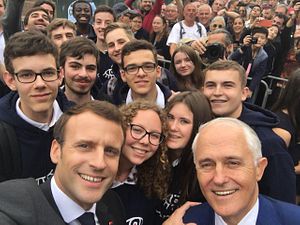French President Emmanuel Macron made his first visit to Australia this week. Interestingly, it was only the second time a French head of state has visited Australia. His immediate predecessor, François Hollande made the trip for the G20 summit in 2014. That France now deems Australia worthy of a state visit is a strong indication that with the current shifting geopolitical conditions the two countries are becoming closer strategic partners and, more importantly, security allies.
Under President Macron, France has indicated it wants to be an important player in the cooperation between like-minded democracies in the Indo-Pacific region, preserving a rules-based order and providing a counterbalance to China’s growing power and influence. Although France’s primary interests remain in Europe, there is an understanding by Macron that the Indo-Pacific region is quickly consolidating its status as the world’s dominant theatre, and the preservation the rules-based order there is important to wider French interests.
Of course, France retains territories in the Indo-Pacific, affording it both skin in the game, and a significant global defense reach. Paris maintains a strong security presence throughout the region, with 4,500 permanent defense personnel located on its Indian Ocean bases, and 2,800 stationed in the Pacific. These regional defense interests are increasingly converging with Australia’s, with both countries concerned about increased China influence, and the unknown of how it may seek to shape the international order.
This concern has seen the defense relationship between the two countries greatly improved. Although the two countries have remained allies, and share historical military cooperation from the 20th Century European wars (Macron presented the Legion d’Honneur to Australian war veterans while in Sydney), the French presence in the Pacific has not always been welcomed by Australia. Previously, France was viewed as a disruptive actor within the Pacific, with the extensive testing of its nuclear weapons between 1966 and 1996, its obstructionist posture towards independence movements in the region, and its blowing up of the Greenpeace vessel, the Rainbow Warrior, in Auckland harbor in 1985.
Yet France’s softer regional approach, and Australia’s need to replace its ageing submarine fleet have allowed the two countries to enhance their ties. In 2016 Hollande secured the $39 billion contract to have the Naval Group (62.5 percent owned by the French state) build the Australian Navy’s new fleet, placing Australia and France in a long-term strategic industrial partnership. Part of the project’s conditions is to provide a significant sharing of French defense industry skills with their Australian counterparts in order to build Australia’s own defense industry capability. The provisions for this played a major factor in Australia choosing the French tender over what could have been considered a stronger Japanese bid. It was announced during Macron’s visit that critical stages in the submarine design process will shift from Cherbourg to Adelaide in 2022.
During Macron’s visit the a Mutual Logistics Support Agreement was signed between the Australian Defence Force and the French Armed Forces aimed at enhancing the interoperability of the two forces. This enhanced cooperation comes after the chief of the French Navy, Admiral Christophe Prazuck, made the suggestion in October last year that Australia and France could potentially conduct joint Freedom of Navigation operations (FONOPS) in the South China Sea. Australia has been resistant to American requests for its participation in FONOPS, however, reports that China has deployed missile systems in the Spratly Islands may shift Canberra’s calculations for any potential cooperation with its security allies. An agreement on cyber security cooperation was also signed.
The release of the joint Vision Statement by the Turnbull and Macron during the visit did not only focus on defense. It also highlighted the two states’ “commitment to work together to resist protectionism, uphold the rules of the global trading system and contribute to the expansion of world trade that supports sustainable development.” The kind of statement actors such as Turnbull and Macron would not have felt the need to reiterate several years ago, but now deem an essential signal to send to both the world and their domestic audiences. In light of this, the two also expressed their desire to expedite negotiations for the prospective Australia-EU Free Trade Agreement.
From Australia, Macron moves on to the French Pacific territory of New Caledonia, where he will take part in the remembrance services for the territory’s unrest in 1988 that led to the independence negotiations which are allowing this year’s sovereignty referendum. While the French president has remained neutral on the referendum question, Australia implicitly signaled its desire to maintain the status quo when it encouraged the full membership of New Caledonia and French Polynesia into the Pacific Island Forum (against previous criteria of only allowing fully sovereign states to join). Australia’s hope being that the peak Pacific multilateral body would benefit from the greater diplomatic, financial, and security muscle that France would bring to the forum.
With Australia recently encouraging the United Kingdom to play a greater role in the Pacific, it seems Australia has been using the same tactic with France as well. Realizing its own limitations in regards to increased Chinese activity in the region, Canberra is seeking balance from the two like-minded European powers with significant naval capabilities. Macron’s visit to Australia indicates that this a role Paris is willing to take.

































